Since independence the country has had three presidents and nine vice presidents, none of whom has hailed from Coast or North Eastern provinces. As for the North Eastern province one could argue that the province is sparsely and least populated in the country as the reason. But as for the Coast province, it is pure marginalization of the region and its people.
Central province has had the lion’s share where it has produced two presidents and one vice president, the founding President Mzee Jomo Kenyatta and the incumbent President Mwai Kibaki. The longtime Othaya MP served his predecessor former President Moi as his first vice president. The expansive Rift Valley province has produced Moi, who first served as Kenyatta’s third and final vice president, before ascending to the presidency himself where he reigned for almost quarter of a century. Kenyatta’s second VP Joseph Murumbi also hailed from this region and so is Moi’s third VP George Saitoti.
Nyanza province produced the country’s founding VP in the named of Mzee Jaramogi Odinga Oginga. Even ‘Nairobi Area’ as a province has had its share of producing a VP in the name of Dr. Josephat Karanja then the MP for Mathare after having shifted his political base from Githunguri. Western province has had the highest number of vice presidents, Musalia Mudavadi, the late Kijana Wamwalwa and the current Moody Awori in that order.
Without beating about the bush it is high time that a Coastal be named vice president. The only person who could make that happen is none other than President Mwai Kibaki. I say so because the two leading presidential candidates opposing the incumbent, Raila Odinga and Kalonzo Musyoka have both already named their running mates who both happen not to be Coastal politicians and incidentally both hail from, you guess it, Western province.
President Kibaki on the other hand is not compelled to name a running mate and has the vintage advantage to name his vice president after the general election. Considering the fact that Kibaki will retire after serving the second and final term (using his own words), it gives him more power and leverage to right some of the wrongs.
When it comes to Muslims, more than forty years after independence, no Muslim has ever come close to be appointed to the vice presidency position. Mzee Jomo Kenyatta did not even see the need or importance of appointing a Muslim to his cabinet. Muslims did not matter in the Kenyatta presidency. Kenyatta successor former head of state Moi on his part only saw the need as a returning a favor to Gen Mahmud Mohamed who had saved his government from the ’82 August coup plotters, when he appointed the Dujis MP Hussein Maalim Mohamed (a brother to Gen. Mohamed) as the first Muslim cabinet minister in the country. It was only toward the end of his long presidency when Moi went head and added two other Muslims to his cabinet. The late Sharrif Nassir served for close to two years and Ijara MP Yussuf Haji joined the cabinet for a very short stint.
Among the three head of states, Kibaki is the only one who is seen to have or be going against the grain by treating Coastals and Muslims as equal citizens of Kenya. In his government, Muslims and the Coast people are holding positions of high profile and powerful cabinet posts, from diplomatic to senior bureaucratic positions.
To speak boldly, if a black man in a racial sensitive United States, Senator Barrack Obama, ironically with Kenya ancestry, can become a serious presidential contender in a major political party, the appointment of a Muslim and or a Coastal vice president should not be seen as an impossible dream.
_________________
Kibaki the best brand in 2007
If there is any politician among the three presidential candidates who is marketable to the electorate is none other than President Mwai Kibaki. Like him or hate him, Kibaki is a tried hand in both management and politics. Kenyans and the electorate have seen the good Kibaki has done to the country in general as their head of state.
One political commentator opposed to the Kibaki candidacy wrote claiming that it would be difficult to market the Kibaki brand. He notes, “It is the season in which the President’s campaign corps hate to be reminded of the outlandish police raid on the Standard Group, Anglo Leasing, and the transformation of the Office of the President, Kenya Revenue Authority, Treasury and Central Bank into modern day exhibition halls of cronyism and tribalism.”
There is cronyism in Kenya as there cronyism in the USA, UK and everywhere in the democratic world. Corruption too is everywhere not restricted to Kenya. I am not saying that because it exists everywhere then it is acceptable, but fighting corruption is not the work of the government alone but the country as a whole. The reason why I raise it here is because the way Kibaki opponents raise these twin issues of corruption and cronyism is as if the world is free of corruption and cronyism but Kenya. Look everywhere in the country, and you will see cronyism and corruption.
It is marketing Raila Odinga and Kalonzo Musyoka that is going to prove to be challenging. All the euphoria that is seen in urban areas and supported by the media houses will not turn in votes. Majority of Kenya’s electorate is rural based and do not read or have access to the newspapers. The two Orange candidates, Raila and Musyoka have not been tested in any executive leadership position. There is nothing to write home about when it comes to Raila Odinga as the country’s minister of Energy (under Daniel arap Moi) and Roads and Public Works under Kibaki. What we know is that Raila returned the roads money back to the treasury when the country roads were still in depilated conditions.
Kalonzo Musyoka who has served in more than four ministries and mainly in Foreign Affairs did nothing memorable that one can recall in an instant. Although the Mwingi North MP likes to take credit for the twin Sudan and Somalia peace agreements as his brainchild but the fact remains that Kenya’s lack of articulated foreign policy is Musyoka’s fault and no one else’s.
Kenyans should not be hoodwinked to vote Raila or Kalonzo because they hate Kibaki for corruption and cronyism. Who knows what magnitude of corruption and cronyism will Raila and Kalonzo introduce to the country in their governments? The Raila/Musalia-led Orange Democratic Movement (ODM) has already started introducing cronyism in its infant administration by declaring the members of the so-called Pentagon will receive automatic nomination in their respective parliamentary constituencies. If that act is not cronyism, isn’t it corruption? ODM has already started to “distribute power” among themselves even before they have secured it. God only knows what will happen if they win the general election.
_______________
Stop Johnies come lately
NARC Kenya politicians, particularly those who were initially opposed to any form of coalition with the rest of President Kibaki friendly parties should not be allowed to take any leadership positions in the new alliance, Party of National Unity (PNU). I say so because what people are seeing is that people like Foreign Affairs minister Raphael Tuju, Narc Kenya chairman and others, all of sudden are starting to become the face of PNU when they were initially opposed to this alliance.
It is a known fact that, there is a group of non-Mount Kenya stalwarts within Narc Kenya led by the party’s secretary general Mukhisa Kituyi who were opposed to any form of a coalition with like minded political parties. They thought President Kibaki will seek re-election using Narc Kenya ticket and they wanted to shut down all those Kibaki supporters who were opposed to their party. They used the United States President George Bush’s failed mantra on the war on terror; ‘you are either with us or against us’.
Interestingly, Mt. Kenya politicians led by the Keini MP Dr. Christopher Murungaru and others like the youthful Mwangi Kiunjuri knew all along that no single political party in the country could win the election on its own. They also saw that, the successful Kibaki re-election bid needs a coalition of all friendly parties they can assemble that support the head of state. There is no doubt that despite claiming officials coming outside the Mt. Kenya region, Narc Kenya is largely a Mt. Kenya political outfit or put it this way, the party stronghold is in Mt. Kenya region, and not that there in anything wrong with that. It is the way that Ford Kenya and Shirikisho are respectively political outfits of Western and Coast provinces.
The birth of PNU, not Panu as the media has branded it, is credit to Science and Technology minister Dr. Noah Wekesa, who tirelessly chaired all the talks that produced PNU. This is despite the fact that majority of Narc Kenya leadership not only snubbed the talks but went even further to undermine the efforts.
Now that PNU is alive and kicking, it should take a leaf from the American national political parties where Republican and Democratic parties have very few national officials. For instance the Democratic Party has only nine national officials and six congressional leadership officials. The reason for this being that the bulk of the party work is done by their respective state levels offices (equivalent to say branches) where the national office only coordinates. Now let us compare the fifteen officials on the Democratic Party to Narc Kenya’s seventy national officials and you will appreciate what I ma trying to say here. One wonders why Narc Kenya needs eight vice chairmen, three deputy secretaries general, three deputy treasurer and on the list goes. The bloated leadership pitiful is what PNU should avoid to fall into.
Of course we cannot ‘copy and paste’ the American party management system but they can modify it to meet their needs. The best way to make PNU stronger and people friendly is to have very few national leadership positions and bare minimum committees. For instance, the flag bearer, in this case President Kibaki becomes the party leader.
All the respective parties’ leaders and or chairmen of PNU should form the party top organ, the Supreme Committee to be chaired by the president and or the vice president. Another important committee, probably be named coordinating committee or conference committee, could be composed of the parties’ secretary generals and the final one would be the PNU Parliamentary Group. Other than the three committees, the bulk of the PNU work should be relegated or delegated to individual parties the same way United States’ state levels are responsible for the respective political parties’ activities in their respective states.
Sunday, September 23, 2007
Subscribe to:
Post Comments (Atom)







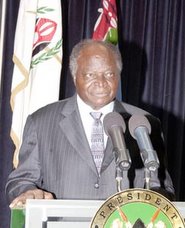


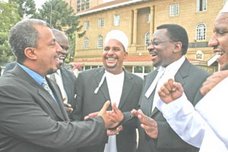
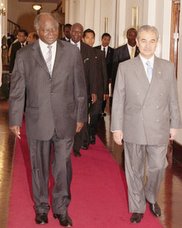

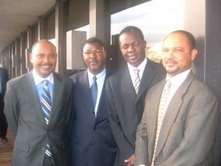
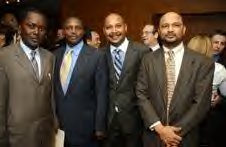
No comments:
Post a Comment